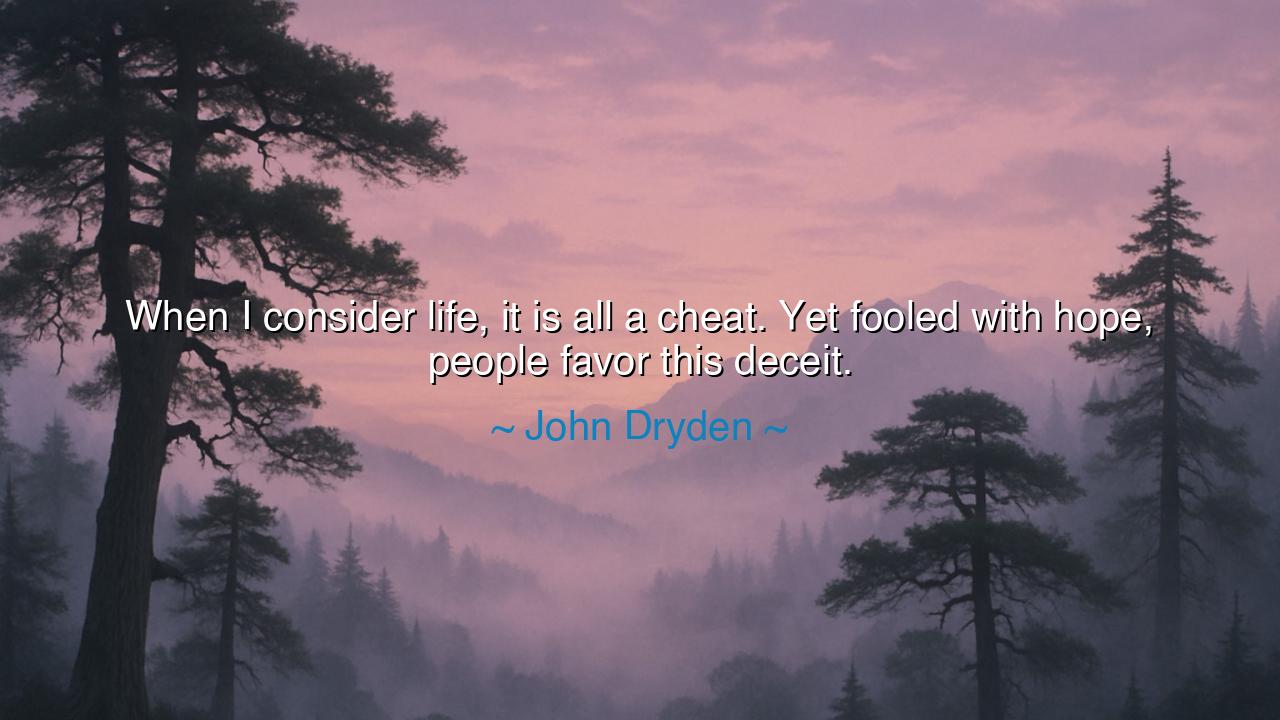
When I consider life, it is all a cheat. Yet fooled with hope
When I consider life, it is all a cheat. Yet fooled with hope, people favor this deceit.






“When I consider life, it is all a cheat. Yet fooled with hope, people favor this deceit.” — John Dryden
In this haunting and profound reflection, John Dryden, the great poet and playwright of the seventeenth century, unveils a truth that lies at the heart of the human condition — the tension between illusion and endurance, between hope and disillusionment. When he declares, “life is all a cheat,” he speaks not in bitterness but in wisdom born of experience. For life, he says, promises much — joy, love, fulfillment — yet often delivers pain, loss, and betrayal. And yet, in the same breath, he reveals the strange paradox that keeps the world alive: though deceived, people continue to hope, choosing to believe in the light even when it is faint and far away.
To understand these words, one must know the world from which Dryden spoke. He lived in an age of turmoil — of kings rising and falling, of faiths clashing, of fortunes built and broken. Having served under multiple monarchs and witnessed the fickleness of human favor, Dryden came to see that life itself is a stage where appearances deceive and fortunes shift like the wind. Yet his tone is not despairing. His insight lies in the second line: “Yet fooled with hope, people favor this deceit.” He understood that hope, though it blinds, also sustains. It is both the world’s greatest lie and its saving truth. Without it, humanity would crumble beneath the weight of its own suffering.
This paradox — that hope is both a deception and a necessity — is one that has echoed through all ages. The ancients, too, grappled with it. The myth of Pandora’s Box tells that when all the evils of the world escaped into human existence — disease, sorrow, and death — only Hope remained. Some say it was mercy; others, a cruel joke of the gods. For what is hope but the will to keep moving forward, even when reason says to stop? And yet, it is this very delusion that has carried humanity through every dark night, every fall, every war and ruin. The deceit of hope may blind us, but it also gives us strength — the sweetest and most necessary of all lies.
There is a story from history that brings Dryden’s meaning to life: the story of Ernest Shackleton, the polar explorer who led his men into the frozen heart of Antarctica in 1914. When his ship, Endurance, was trapped and crushed by ice, the men faced certain death. Yet Shackleton never surrendered to despair. He gave his men tasks, kept their spirits alive, and promised survival when logic said none could survive. For months they lived on hope — fragile, impossible hope — until, against all odds, they were rescued. Was their hope a deceit? Perhaps. But it was also the very thing that saved them. As Dryden would have understood, hope’s illusion can become the engine of endurance.
Dryden’s insight also reveals the tragic nobility of the human heart. To hope, even when betrayed, is the most courageous act of all. The wise may see through life’s illusions — the vanity of ambition, the frailty of love, the certainty of death — and yet still they choose to live, to dream, to build. Why? Because to abandon hope is to surrender the will to live. The deception may be known, but it is cherished nonetheless. Thus, humanity walks willingly into its own illusions — not as fools, but as believers in the unseen goodness that might yet come.
In his reflection, Dryden also reminds us of the strange balance between truth and illusion. If we strip life of all its deceits, we are left with bare reality — and bare reality is too cruel to endure. The dreamers, the lovers, the builders — all thrive on some measure of illusion. Even faith itself, in its purest form, is a hope unseen, a trust in what cannot be proved. Therefore, the wise do not despise life’s deceptions; they see them as part of the design — a veil that protects the heart from despair, and gives meaning to struggle.
Lesson:
From John Dryden’s somber wisdom, we learn that hope is both our greatest illusion and our greatest gift. Life will deceive you — promises will fade, joys will perish — yet still, do not cast off hope. For though it may fool you, it will also fuel you. It is the quiet force that drives men to create, to love, to endure. To live well, one must learn to embrace hope — not blindly, but bravely. Accept its deceit, but use its power. Let hope be the light that guides you, even if it is fragile, even if it flickers. For in that flicker lies all that makes life worth the cheat — the dream that, though we may never conquer despair, we may still live as if victory were possible.






AAdministratorAdministrator
Welcome, honored guests. Please leave a comment, we will respond soon